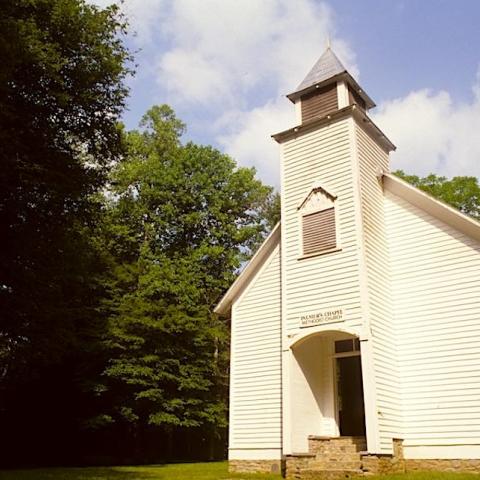
A drug overdose, not a bear attack, killed a man poaching ginseng in Great Smoky Mountains National Park last fall/NPS file
Drugs, not a bear, killed a Tennessee man who headed into Great Smoky Mountains National Park last fall to poach ginseng roots, according to the autopsy results.
Unfortunately, park officials decided in September that a bear believed to have fed on William Lee Hill, Jr.'s body might have attacked and killed him, so they killed it.
Hill had gone into the park last September 7 to hunt for ginseng, a high-priced root used by some as a traditional home medicine. Prices can go as high as $800 a pound for ginseng. While the root can be collected outside the park, it is illegal to do so inside the boundaries.
The man's body was found September 9 in the woods about 2 miles north of Cades Cove and about a half-mile from the Rich Mountain Road. When searchers found his body, which had signs of being fed on by predators, they also encountered a black bear that was acting aggressively towards them.
Since it wasn't known whether the bear had killed Hill or fed on his body, a decision was made to sedate the bear and place a GPS radio collar on it and let it go pending further information, park staff said at the time. The next day, park staff, in discussions with Superintendent Cassius Cash, decided to destroy the bear. Park staff announced on September 16 that the bear was killed that morning near where Hill's body was found.
The effort to kill the bear was complicated, requiring five shots over three days.
"The biologists spent several days tracking the bear and were consistently challenged by weather, terrain, thick vegetation, and the elusive behavior of the bear," park spokeswoman Dana Soehn told the Traveler in October. "The bear was located on the second day of tracking in a thick stand of rhododendron, and a biologist did attempt to shoot it, but the shot was not lethal. Three days later, park staff successfully located and euthanized the bear via gunshot (four shots)."
A necropsy on the bear indicated that it was not in a weakened condition and desperate for food. Its teeth were in good shape, and its belly was "full" of acorn meat," noted the pathologist, who made no mention of human remains in the stomach.
Park staff said Monday that they recently had received the autopsy report on Hill, and pathologists had determined that he had died of accidental methamphetamine intoxication.
"An autopsy revealed extensive postmortem animal predation, but no findings of antemortem/perimortem trauma (i.e. Mr. Hill was not attacked by a bear)," the report added.
Great Smoky is home to an estimated 1,500 bears. Very few bears exhibit aggressive behavior towards humans. Wildlife biologists and park rangers work hard to prevent bears from becoming food-conditioned or habituated to high-use areas. Out of an abundance of caution for the park's 11 million park visitors, park staff implement aversive-conditioning techniques and, on rare occasions, euthanize individual bears that pose a threat to visitor safety.




 Support Essential Coverage of Essential Places
Support Essential Coverage of Essential Places







Comments
A bear who posed no danger to humans suffered from shotgun wounds for THREE DAYS! before succumbing to them! What kind of clowns are working at that Park? They decided to shoot the bear with no proof it was the bear's fault the man died. Not only was it the guy's own fault, but the bear had to pay for it with his life! What a horrible thing! Everyone involved in shooting the bear needs to be fired NOW and never be allowed to work for the US govt again! The whole thing is despicable!
Missing 411. Another cryptid kill. Don't believe anything coming from a government agency
I agree- otherwise, what was the purpose for the autopsy?Certainly the bear could have been caught and sedated. When necessary, they do it all the time with the Grizzlies out west.
How do they know it was even a bear that "consumed his flesh"? It could have been a coyote. Bears eat mostly vegetation but are opportunists. That said, had there been human remains in the bear's necropsy, they likely would have released that information to the public. I believe that they should have concluded the poacher's autopsy BEFORE assuming that it was "an aggressive bear". That man was breaking the law in bear habitat. His actions killed this animal, not the other way around. Focus needs to be on educating and penalizing visitors first and foremost. Never assume ANYTHING especially when all the facts aren't determined and the investigation is incomplete.
I agree. And really, is there really any way to tell that he wasnt attacked & eaten? Even if the man was super high on drugs, black bears are super predatious, especially the males. They made no mention of human remains in the stomach, but the bear could have pooped that out by then . Cade's Cove has a lot of aggressive black bears there, and the larger their numbers, the more attacks happen across the U.S. I believe people are blinded by biologists and others in the NPS just how dangerous its getting for encounters between people and bears. They're not called predators for nothing.
Black bear's are not "super predatious" their main diet consists of grasses, berries, nuts, fruits and insects. They will scavenge a carcus. But predatory behavior does arise and is extremely rare towards humans.
Usually not a bad dog (bear) but a bad human.
Horrible! This is a gruesome story. The use of drugs not only effected the user but also this poor bear. Ginseng is big business in that area and is part of the culture, illegal or not. The meth added to the mix is a recipe for disaster.